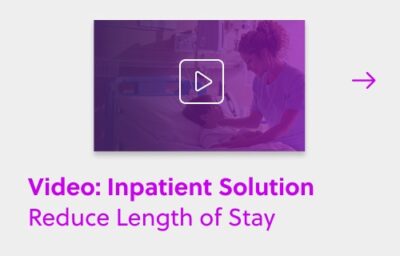As 2019 approaches, it’s a natural time to take stock of what has happened in the last year and look toward the future. In 2018, we saw tech titans make highly anticipated forays into healthcare, digital startups continue to transform the patient experience across the care continuum, and a growing interest in AI (artificial intelligence) and ML (machine learning) applications across the industry.
We declare 2019 the Year of AI Operationalization in Healthcare. Here are the 4 ways we see this playing out in 2019.
#1: Technology (finally) that works for, not against, physicians, nurses, and care teams
We’ve thrown technology at healthcare for years, but, so far, it has only added complexity to the workload of healthcare teams, and it has not necessarily translated to improved care or streamlined operations. Hospital staff feel the added burden of piecing together data from tools and dashboards on disparate IT systems that don’t talk to each other. The time and effort it takes to learn a new system can take physicians and nurses away from what they are best at: providing excellence in clinical care. For too long, health systems have introduced new technology that adds to the burden of care teams.
In 2019, we predict the tide will turn at last. Hospitals need to combat the workload burden not by taking away technology, but by giving frontline teams technology that actually works for them.
AI has the potential to give frontline providers unprecedented insights to make operational decisions easier for them so they can focus on patient care. But, any tool will need to be a solution that teams actually fall in love with (if you can fall in love with your iPhone, why shouldn’t you fall in love with other technology?). And, at the end of the day, it has to deliver significant, game-changing value. Gone are the days where incremental value was enough.
#2: AI strategies will start with non-clinical victories
Even as the FDA in 2018 cleared the way for the first clinical AI applications to be used in practice, we believe the most immediate AI/ML applications in healthcare will happen behind-the-scenes. AI can significantly improve the reliability of operations in healthcare, and it can enable staff to do their jobs without the Herculean effort to navigate around the cumbersome processes slowing them down now.
For years, healthcare teams have tackled operational challenges through performance improvement initiatives, redesigned workflows, and training. When technology has been layered onto these efforts, it’s too often made operations even more complex. AI has the potential to change all that, and that’s why we see the best place to start an AI for health system leaders is to address these operational and patient flow challenges. There’s precedent, too, in how we’ve seen AI play out in other industries.
#3: Out-of-industry AI logistics innovation comes to healthcare
AI and smart logistics have already revolutionized industries like retail and transportation. Amazon, for example, has set the new standard for retail with its last-mile delivery that partners with any number of third-party providers to get orders to customers blindingly fast, while Uber has taken the AI approach it mastered with transporting people and applied it to delivering food and packages. As healthcare has often followed on the heels of these industries, we believe the trend will continue with AI applied in hospital operations next. Hospitals in the U.S. already have the most advanced care teams, world-class therapies and best equipment—but we still function with third-rate operations. There’s a striking chasm between our clinical care and our operations, because we now have overly complex, inefficient systems and processes.
Just as other industries have done, health systems can turn around the problem by putting data to use for their operations and people. Fortunately, with EMRs, we now have the data. It’s time to put it to use in real-time for frontline teams.
#4: Solving hospital operations unlocks years of CX investments
Retail and other consumer industries have already adapted to the new reality of today’s economy: customer experience is king. Consumers have more choice than ever, and they take advantage of that. Health systems have been acutely aware of this trend and have made concerted efforts to invest in new consumer-centric models and technologies in recent years. But despite all of this shiny new consumer tech, the operational challenges in the hospital remain — and are often the biggest point of dissatisfaction for patients today.
Even with the most user-friendly telemedicine solutions and patient-facing hospital apps, patients will still be dissatisfied if they show up to the emergency department and experience a long wait or if they experience a prolonged discharge process at the end of their inpatient stay. Health systems need to deliver on the consumer experience, and having world-class operations will enable them to get credit for their investments in consumer experience initiatives from the eyes of consumers.
2019: The Year of AI Operationalization
The pace of technological change in the healthcare industry continues to accelerate. To date, healthcare has played the technology catch-up game with other industries and is burning out our best clinicians and frontline teams. Now, new technologies such as AI and ML have started to offer real hope by making technology and data work for—not against—these teams.
But delivering on the promise of AI requires much, much more than adding an algorithm to an EMR. Operationalizing AI means putting the power of predictive and prescriptive analytics into the hands of frontline workers in delightful, intuitive ways that drive results that matter. It takes designing the technology into existing workflows and driving the behavior change of adoption so that frontline teams truly experience the benefit of the technology everyday in their work.
We believe health systems are ready to seize the opportunity. 2019 is the time.


